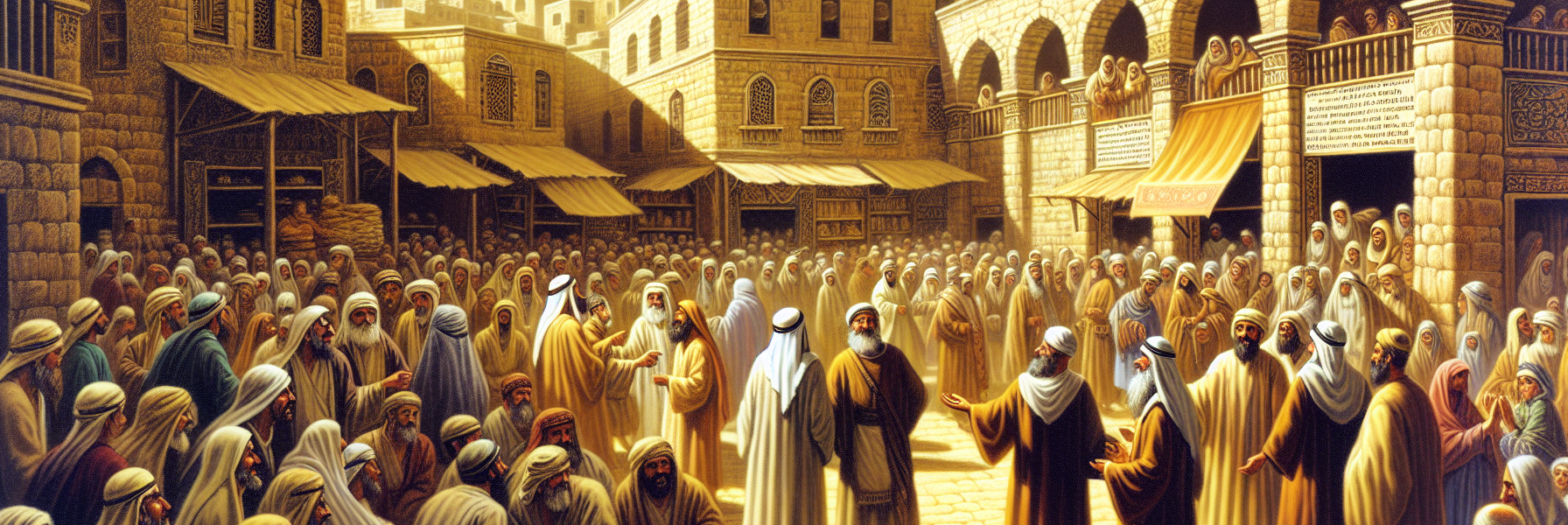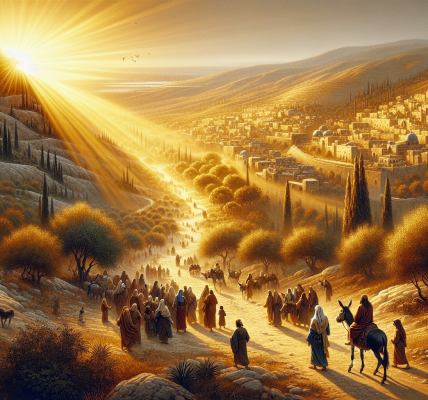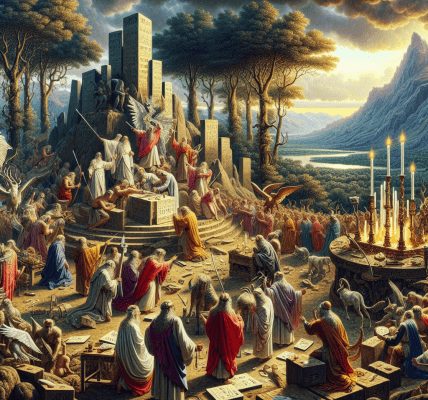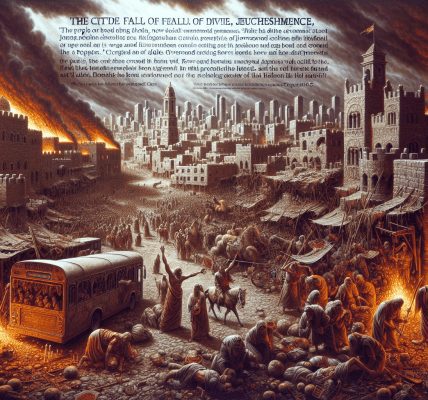**The Council of Jerusalem: A Story of Grace and Unity**
The sun hung high over Jerusalem, casting golden light upon the ancient stones of the city. The streets buzzed with pilgrims, merchants, and priests, but within a modest gathering place, a far greater matter was unfolding—one that would shape the future of the fledgling church.
News had spread quickly through the assemblies of believers: men from Judea had traveled as far as Antioch, teaching the Gentile converts, *”Unless you are circumcised according to the custom of Moses, you cannot be saved.”* These words had stirred great turmoil among the believers, for many of the Gentiles had come to faith in Christ with no prior knowledge of the Law. Paul and Barnabas, who had witnessed the mighty works of God among the Gentiles, had fiercely disputed this teaching. The debate grew so heated that the church in Antioch decided to send Paul, Barnabas, and a few others to Jerusalem to seek the counsel of the apostles and elders.
### **The Journey to Jerusalem**
The road to Jerusalem was long and dusty, winding through hills and valleys. As Paul walked beside Barnabas, his mind was heavy with concern. He had seen the power of the Gospel transform the hearts of Gentiles—Lydia the seller of purple, the Philippian jailer, and so many others. The Spirit had fallen upon them just as He had upon the Jewish believers. Would the church now place upon them a yoke they could not bear?
Barnabas, ever the encourager, laid a hand on Paul’s shoulder. “The Lord has guided us this far,” he said. “He will not abandon us now.”
Paul nodded, but his jaw was set with determination. The Gospel was at stake.
### **The Gathering of the Apostles**
When they arrived in Jerusalem, the church welcomed them warmly. The apostles and elders gathered to hear their report. Peter, his beard now streaked with gray, sat with James, the brother of the Lord, whose quiet wisdom commanded great respect. Around them were other leaders—John, who had once been called a Son of Thunder but now carried a shepherd’s gentleness, and elders who had walked with Jesus in the days of His ministry.
The meeting began with Paul and Barnabas recounting all that God had done among the Gentiles. They spoke of the miracles, the conversions, the unmistakable evidence of the Holy Spirit’s work. The room listened intently, but soon, murmurs arose from some of the Pharisees who had believed.
“These Gentiles must be circumcised and instructed to keep the Law of Moses,” one insisted. “How else can they be part of God’s people?”
The debate grew fierce, voices rising like waves crashing against a shore. Then Peter stood. The room fell silent.
### **Peter’s Testimony**
“Brothers,” Peter began, his voice steady, “you know that in the early days, God chose me to preach the Gospel to the Gentiles, so that they might believe. He gave them the Holy Spirit, just as He did to us. He made no distinction between us and them, cleansing their hearts by faith.”
He paused, his eyes scanning the room. “Why then are you testing God by placing a yoke on the disciples that neither we nor our fathers could bear? No! We believe it is through the grace of our Lord Jesus that we are saved, just as they are.”
A hush fell over the assembly. The truth of Peter’s words settled like a balm over the tension.
### **James’ Judgment**
Then James rose. His voice was calm but carried the weight of authority. “Listen to me, brothers. Peter has recounted how God first visited the Gentiles to take from them a people for His name. This agrees with the words of the prophets, as it is written:
*‘After this I will return and rebuild David’s fallen tent. Its ruins I will rebuild, and I will restore it, that the remnant of mankind may seek the Lord, and all the Gentiles who bear my name, says the Lord, who does these things.’*
“Therefore,” James continued, “it is my judgment that we should not make it difficult for the Gentiles who are turning to God. Instead, we should write to them, telling them to abstain from food polluted by idols, from sexual immorality, from the meat of strangled animals, and from blood. For Moses has been preached in every city from ancient times, and his words are read in the synagogues on every Sabbath.”
The room was still. Then, slowly, nods of agreement spread among the elders. The wisdom of James’ words had bridged the divide.
### **The Letter of Unity**
With the matter settled, the apostles and elders, with the whole church, chose Judas called Barsabbas and Silas, leaders among the brothers, to accompany Paul and Barnabas back to Antioch. They drafted a letter, carefully inscribing the decision:
*”The apostles and elders, your brothers, To the Gentile believers in Antioch, Syria, and Cilicia: Greetings. Since we have heard that some went out from us without our authorization and disturbed you, troubling your minds with what they taught, we have unanimously decided to choose men and send them to you with our dear friends Barnabas and Paul—men who have risked their lives for the name of our Lord Jesus Christ. Therefore we are sending Judas and Silas to confirm by word of mouth what we are writing. It seemed good to the Holy Spirit and to us not to burden you with anything beyond the following requirements: You are to abstain from food sacrificed to idols, from blood, from the meat of strangled animals, and from sexual immorality. You will do well to avoid these things. Farewell.”*
### **Joy in Antioch**
When the messengers arrived in Antioch, they gathered the church and read the letter aloud. The believers listened, their hearts swelling with relief and joy. The words were not of condemnation but of grace—a confirmation that salvation was by faith in Christ alone.
Judas and Silas, both prophets, encouraged the brothers with many words and strengthened them. After some time, they returned to Jerusalem in peace, but Silas chose to remain, his bond with Paul and Barnabas deepening.
And so, the church continued to grow, united not by the Law but by the Spirit, bearing witness to the truth that in Christ, there is neither Jew nor Gentile—only one body, redeemed by grace.
**The End.**




